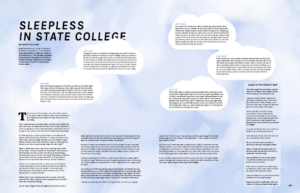
Whoever said “sleep is for the weak” was seriously disturbed. Sleep controls your life physically, mentally, socially and emotionally, yet college students are constantly skipping it in favor of other activities. Here’s how to achieve a good night’s sleep you could only dream about.
Day One
Start by taking into account what time you went to sleep last night. Plan to go to sleep 30 minutes earlier. Aim to get all time-sensitive tasks done as early as possible. If it doesn’t need to be done for the next day, save it for later. Dim the lights and carry out your nightly routine as you normally would, just aim to be in bed at the correct time. Rule number one of this process is that your bed is for sleeping only. Do not go on your phone, watch television or do work on your laptop in bed.
Day Two
Congratulations! You made it through night one, and it’s time to go to sleep another 30 minutes earlier. Tonight, make sure there’s at least a two-hour gap between your workout and sleeping. Ensure that your shower is at least one hour before you sleep. Rule number two is to avoid activities that increase blood flow prior to resting. Dancing and laughing all night with your friends is great for the weekends, but making it a nightly routine will only hurt you in the end since stimulation before bed is harmful to your sleep.
Day Three
You may be in the popular habit of catching some screen time before bed, but rule number three is that screen time of any kind is detrimental to acquiring the proper amount of quality sleep. Tonight, go to sleep another 30 minutes earlier, but turn the television off a little earlier as well. If you need some sort of noise to lull you to sleep, play a genre of music that you find relaxing. If you simply cannot stay off your iPhone, swipe up and turn the ‘night shift’ option on. Turn the lights off, give yourself 10 minutes to whatever you need to do on your phone, and then go to sleep.
Day Four
Rule number four is to practice activities that promote quality sleep. Yoga, meditation and walking are all low-intensity activities that relax the mind and prepare the body for sleep. Relieve stress with one of these activities rather than laying in bed with stress building up in your mind. Tonight, go to sleep another 30 minutes earlier and when you put your phone down, pick up a book and read instead. Reading can enhance sleep quality and reduce cortisol levels, therefore reducing stress.
Day Five
It’s the last night, so really push to go to sleep 30 minutes earlier one more time. It might seem hard, but it’s the last night. Try adding a cup of milk or chamomile tea before bed to help. Chamomile also serves as a sleep-inducing scent along with other scents like lavender, jasmine, vanilla and many more. If noise is an issue, you might need ear plugs or use a cotton ball to block it out. Rule numbers five is to find things that soothe you and consistently practice everything that you’ve already been doing every night.
There are so many things in our lives that we never think about when we take our sleep into consideration. But these daily tasks become major obstructions to our sleep. Homework, exercise, going out, showering, eating late, watching TV and even our thoughts all play into why we’re not getting enough sleep.
Dr. Orfeu Buxton, an associate professor of biobehavioral health at Penn State says, “To learn in class and take in new information, you have to get the right amount of sleep the night before … and to convert that short-term memory into long-term memory, you have to get enough sleep the next night.”
Sleep is also linked to your short-term and long-term health. Buxton says, “Sleep is a period of restoration, infrastructure maintenance and body repair, and when we shortchange ourselves on sleep, we are also cutting off time that our immune system needs to help us repair and recover.” If that doesn’t convince you to get some more shuteye, Buxton continues,
When we are sleep-deprived our body has a bias toward conserving more energy inappropriately, so we become pre-diabetic and are more likely to put on weight. Those with sleep difficulties are more likely to show symptoms of or have depression or anxiety disorder.”
People with a lack of sleep also suffer socially. They walk around with a dark cloud over their heads and carry it around with them everywhere they go.
Buxton says, “Negativity is contagious and a person who is sleep-deprived views another person’s face as more threatening than they normally would. So that dark cloud is, in part, because we think everyone is against us, which leads to degraded social interaction.”
Though it’s based on personal activity level, a college student typically needs about eight hours of sleep to function normally and less than 50 percent of college students are getting it. By the end of this cumulative cycle, you should be able to get a sufficient amount of sleep and be up bright and early for your 8 a.m. class.
Leading a rewarding and full life during the day is also key to a good night’s rest. Buxton says, “Expressing creativity, getting good exercise, interacting with other people, and enjoying life — that’s a good entry for a good night of sleep.”
Next time you’re thinking about pulling that all-nighter, remember that you should prioritize your overall health and well-being first. To get enough sleep means not just one time, but a lifestyle of obtaining enough sleep over time, being truly present for the experiences you have and being able to remember them because getting enough sleep is a part of the memory, Buxton adds.
If this five-step schedule works well for you but you still want to go to sleep earlier, keep going to sleep earlier every night in small increments until you reach your bedtime goal. Sleep tight, State College!

